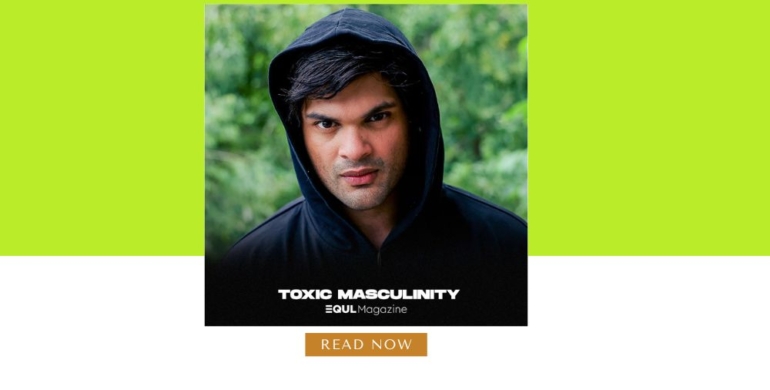TOXIC MASCULINITY
Simp. Pussy. Fattu. Lallu. Chakka.
What was your reaction to these words? Was it disgust? Fear? Anger? How about shame? If you’re a cis man, you likely felt this intimately and directly. You likely felt scared that, one day, you might get accused of being one or more of these words. They’re words commonly used by men against men who deviate from toxic masculinity norms that are all too common in India. It’s the stain that we weaponize against men who wear nail polish, men who wear pink, feminist men, emotionally available men, supportive men, vulnerable men, loving husbands, gentle fathers, respectful lovers, and equal partners. I’m sorry if this has ever happened to you if you were one of these men that weren’t allowed to be your best selves because of the perpetuated stigma in society that permeates these hostile characteristics as masculinity even today. I’m here to tell you that we can do better and we can change this.
It’s never been manly to stand against women’s rights. The people who taught you that were conditioned to perpetuate sexism as masculinity. Is this what you want masculinity to mean to you? It’s never been manly to bully men, shame them for expressing themselves, or punish emotional vulnerability. The people who taught you that believe weak mental and emotional health are virtues of masculinity. Is this what you want masculinity to mean to you? It’s never been manly to treat women as sex objects to be touched, harassed, and pursued aggressively with little to no respect for their consent or boundaries. The people who taught you that are comfortable living in a world where women aren’t valued as equal human beings.
My dad once called me a metrosexual man because I didn’t have the same physical strength as my sister, because I didn’t shy away from complimenting good-looking men, because I didn’t watch or play sports, because I was able to helpfully provide feedback on outfits for my mother and sister. He meant well, he wasn’t trying to put me down, but it was a very solemn reminder to me that masculinity continues to be defined a certain way. I grew up punished for crying. I grew up under the constant pressure of making money. My mental health struggles weren’t given the attention they needed which has left me playing catch-up in my 30s. I’ve had to teach myself how to establish boundaries, how respect consent, and how to be a feminist. I’ve learned that my empathy for others and emotional intelligence wasn’t a weakness, despite being raised to believe otherwise.
And this is just at home. I’ve been judged for being different by society all the time growing up.
I get judged for not trying to sleep with my female friends. I get judged for not laughing at sexist jokes. I get judged for carrying my friend’s purse. I get judged for platonically kissing my guy friends on the face or telling them that I love them. I’ve taught myself to strive above it. I’ve taught myself to be larger than life so I don’t shrink too much when society chips away at me. I’ve taught myself to be as unabashed as possible even in the face of irrational judgment so I can potentially reverse the flow and inspire others to backtrack on their toxic masculinity. And it’s hard. If you’ve been where I’ve been, you know how tremendously difficult it is to constantly fight the societal strain just to be your best self.
It’s senseless to try and fit a norm that is inherently toxic and emotionally unhealthy, we can be better than this. We can change this. Toxic masculinity is only toxic if we continue to perpetuate it. Society taught us to be like this but we don’t have to accept this. We don’t have to live like this and more importantly we don’t have to perpetuate this by bullying and shaming other men to fit a norm that has never benefited anyone.
Be your best self. Be better. Be kinder. Cry. Tell your guy friends you love them. Go to therapy. Paint your nails, try some make-up, experiment with your look, fall in love with your body. Be happy and remember that I support you. Be the kind of guy that inspires other guys to be their best selves without shame.
Writer: Abhay Gupta
There are no comments



